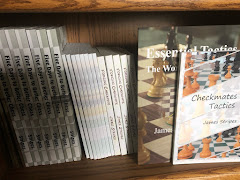Dragon Chess Camp starts tomorrow and runs all week. It is a chess camp for youth going into grades K-6. In the camp, the kids will solve chess problems, practice endgames, learn tactical motifs, and compete against each other. Each day, I will take them through at least one game between strong players. Their workbook contains ten annotated games. I wrote this workbook. Its preparation occupied the bulk of my chess time the past two weeks.
I prepared the following games:
Szen -- Falkbeer, Vienna 1852 (endgame only)
Loewenthal -- Szen, Budapest 1842
Lichtenhein -- Morphy, New York 1857
Morphy -- Loewenthal, London 1858 (game 8 of match)
Morphy -- Loewenthal, London 1858 (Game 12 of match)
Tal -- Uhlmann, Moscow 1971
Botvinnik -- Tal, Moscow 1960 (game 2 of match)
Chernin -- Yudasin, Sverdlovsk 1984
Seirawan -- Bisguier, San Diego 1975
Seirawan -- Karpov, Saint Louis 2012 (game 1 of match)
In addition, the workbook contains an annotated fragment of Pillsbury -- Lasker, Nuremberg 1896. I annotated this game in 2004 and it has become a standard in my summer camp workbooks. Because the same opening as Lichtenhein -- Morphy appeared, the workbook includes the unannotated game score of Botvinnik -- Tal, Moscow 1960 (game 12 of match). My annotations were enhanced through study of several printed texts: Emanuel Lasker, Lasker's Manual of Chess; Valeri Beim, Paul Morphy: A Modern Perspective; John Nunn, 101 Brilliant Chess Miniatures; Mikhail Tal, Tal Botvinnik 1960: Match for the World Championship; Vincent McCambridge, The Games of Yasser Seirawan.
There will not be sufficient time to go through all of these games. The camp participants get to keep their 82 page workbook at the end of camp. My hope is that some of them will find time later in the summer to study some of the other games.
My workbook contains an important section on pawn endgames. Naturally, I reviewed these while writing this year's workbook. This is my fifth year of a one-week chess camp the week after school let out for the summer. The past four years, the camp was called Black Knights Chess Camp, as it was held in Deer Park, where I coach the Black Knights Chess Team. This past year was my first as coach of the Saint George's School Dragons chess team, and I moved my camp to the new school. Funding for the Deer Park program remains uncertain for next year. The old source of funding was eliminated by the state in budget cuts more than one year ago, but the district found a source of temporary funding for the year that just ended.
Routine Training
In addition to reviewing elementary pawn endgames, I continued with frequent tactics exercises.
I attempted 47 problems in three sessions on Chess Tempo. Having watched my percentage drop the past couple of weeks, I slowed down in the third session. The slowing kicked up my average recent per problem time by 20 seconds, but gave me one session with 63% over 16 problems.
I spent 4:48 correctly solving Problem 77240. That was my longest time on a single problem.
White to move
Problems Done: 1941 (Correct: 1052 Failed: 889)
Percentage correct: 54.2%
Average recent per problem time spent 89 seconds
Perhaps a dozen or so problems with Shredder's iPad app.
1695 puzzles: 13289/16950 points 78%
last 10 puzzles: 73/100 73%
Thanks to the recommendation of fellow blogger AoxomoxoA, I tried a new site for training: Chessity. See
"Chessity: New Tactics Server "from" the developer of the Steps (Stappen) method" at AoxomoxoA's blog. The problems there seem to differ from Chess Tempo in the skill sets that they develop. More will be written concerning the nuances of tactical skills in problem solving. I solved 137 problems.















Fine problem. It is very easy to focus on the close in moves here - but you need to zoom out!
ReplyDelete